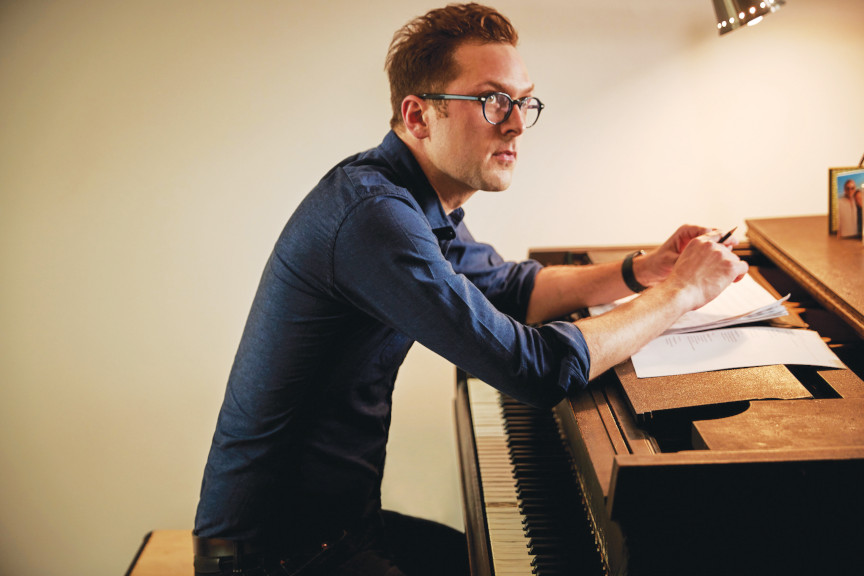Composer Scott Ordway is a 21st-century auteur. His eclectic creations involve music, video, performative installations, poetry and photography. All of this handmade rigor dissolves boundaries while lifting symphonic music into a realm that has no name, other than perhaps “exquisite.”
Growing up in Santa Cruz, Ordway recalls wanting to be a rock critic after years of exploring the indie music scene on the porch of Cafe Pergolesi and at the Catalyst. Hearing an orchestra for the first time in Seattle, he realized it had the power to echo the punk intensity he’d grown up with.
“It blew me away. I was a guitarist, and had played in any number of interesting basements in Santa Cruz,” he says with a chuckle in a phone interview last month. “After hearing the orchestra, all of a sudden I became a music major. Learned piano, bought a cello, I threw myself into it.”
Next he studied composition at the University of Oregon, and discovered the grand symphonic works of Gustav Mahler. “I was inspired by Mahler’s 19th-century model of composing, where you had to be able to play the instruments, conduct and perform, as well as compose. It was not the intellectual or technical model of the 20th-century composition.” Growing up with mountains, oceans and natural splendor within a “secular California context,” Ordway was drawn to Mahler’s combining of natural forces with spirituality. “I was drawn to the way that Mahler answered the big questions,” he says.
Now an assistant professor of music at Rutgers University, Ordway finds endless opportunities for creative work. In one of his classes, students investigate the acoustics of natural landscapes. These foraged sounds inspired his latest compositions; In the Kingdom of Bells began with a single sound.
“I’m intrigued by the change of scale, seeing what might happen,” he says. “[From] one bell, at what point of multiplying the number of bells does the sound become miraculous? Ten bells? One hundred bells? All the bells in the world?”
He favors exploring orchestral depth, rather than theme and variation. Citing the example of the ocean, he says, “It’s water all the way down, but the material can have different meaning, at different depths. Even though it’s all still water.”
Ordway’s The End of Rain, receiving its world premiere this weekend at the Cabrillo Festival of Contemporary Music, is part anthropology, part documentary, with installation, projected images and docu-poetic text sung by festival artists Roomful of Teeth. The effect will come close to 21st century opera, in the Wagnerian sense of the complete work of art.
“The summer of 2020, two days before the lightning storm [that sparked the CZU Fire], my parents were driving across the country to come see their newest grandchild,” says Ordway. “They continued east, but were glued to the images we were seeing of where the fire was, how it moved. My parents felt helpless, having left without being prepared to possibly lose their home. It really hit home emotionally for me. I had wanted to create during the pandemic, but everything was closed down. So I started making films, video and soundtracks, working back and forth from images, to then creating sound, and then back again to the images. It was fascinating to do both simultaneously. The two media wrapped themselves around each other. I came back to Santa Cruz in the winter of 2020, and drove all over taking pictures to see the impact of the fire in those places so familiar to me.”
Ordway invited people in the area to respond to his prompts about their experience during the wildfires. The composer took the accumulated 80,000 words and looked for themes. He extracted words as a structure for symphony, and to help illuminate the images he’d collected. The photographs were chosen as responses to words.
“I’d known about Roomful of Teeth for years—they’re a phenomenon in contemporary music—and at this point I pitched the piece to Cabrillo,” he says.
Once he had the go-ahead for a commissioned piece, he began working on the music. “The text grounded the piece,” says Ordway. “First and foremost, it was about the voices of the people who responded.”
He also put together a fine-art photography book for The End of Rain that collects 97 photographs, as well as the complete crowdsourced texts from those who talked about the impact of fire on their lives.
Ordway predicts that multi-media will continue to be part of his musical work going forward. “Images offer so much possibility to go deeper. In the last 10 years, the sense I have is more people are doing that. But that means that the bar’s going to get higher,” he says. “It’s not enough to simply have a position. You have to ask and answer a worthwhile question.”
“The End of Rain,” by Scott Ordway, a 40-minute multimedia work created for the Cabrillo Festival Orchestra and vocal ensemble Roomful of Teeth, has its world premiere Friday, July 29 at 8pm. cabrillomusic.org. The accompanying book is available at Bad Animal in Santa Cruz, and at scottordway.com.













Where can one hear the music?